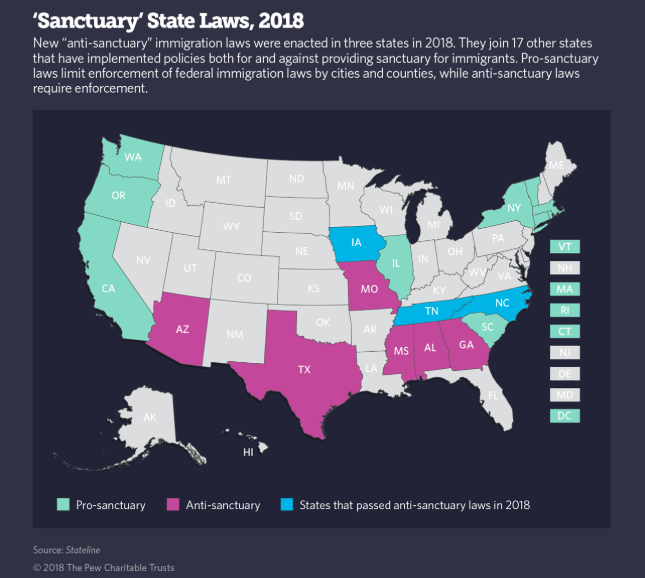Connecting state and local government leaders
Federal immigration policy is prompting reactions in cities and states.
This article was originally published by Stateline, an initiative of The Pew Charitable Trusts, and was written by Tim Henderson. It is Part Five of Stateline's 2018 Legislative Review.
Austin recently took a new tack in the ongoing war between “sanctuary cities" and federal immigration authorities. Declaring itself a “freedom city,” the Texas capital instructed its police officers to arrest fewer people for minor crimes—to prevent their fingerprints from going to U.S. Immigration and Customs Enforcement—and to inform people that they may refuse a request to present their immigration papers.
Though novel, Austin’s gambit fits into a broader pattern: As the Trump administration this year ratcheted up its efforts to curb illegal immigration, cities and states experimented with new ways to resist—or assist—the crackdown.
California declared itself a sanctuary state, prompting pushback from some of its counties. Connecticut, Illinois, Rhode Island, Vermont and Washington also enacted statewide measures to limit law enforcement cooperation with immigration authorities, while New Mexico weighed stricter state oversight of immigrant detention facilities.
Meanwhile, Iowa, North Carolina and Tennessee enacted anti-sanctuary laws requiring cities to cooperate with immigration authorities, and lawmakers in 16 other states tried but failed to do the same, including Virginia, where the majority Republican Legislature passed a bill and the governor, Democrat Ralph Northam, vetoed it. In Oregon, a group favoring a crackdown on illegal immigration put a measure on the November ballot that would undo that state’s 1987 sanctuary law.

Austin acted after courts largely upheld Texas’ 2017 anti-sanctuary law, which, among other things, explicitly allows local law enforcement officers to question the immigration status of people they detain or arrest.
The state’s Republican attorney general, Ken Paxton, called the Austin policy part of a “pattern of disrespect for the rule of law,” and GOP Gov. Greg Abbott said the state’s policy is a matter of public safety. “Texas will not be complicit in endangering our citizens,” he said. The state has pledged to defend any law enforcement agency that is sued for following the law.
Despite state officials’ fierce opposition to Austin’s “freedom city” declaration, one advocate for undocumented immigrants predicted the policy will spread to other Texas cities.
“This is a statewide effort because we live in an anti-immigrant state,” said Yuridia Loera, a 22-year-old organizer with Austin’s United We Dream network of unauthorized young people. Loera is among many youths who—brought to the United States illegally as children—live in constant fear of an arrest for minor crimes like driving without a license, which could start an immigration investigation.
“We cannot relax,” Loera said. “I live in Texas and I drive every day and I get goosebumps every day wondering if I’ll get pulled over.”
The divide in Texas between pro-immigrant cities on one side, and state officials and rural and suburban counties who want to crack down on illegal immigration on the other, is playing out in other states too.
“The general trend is that Southern big cities are becoming more liberal than their state and suburbs, and less involved with [assisting federal officials with] immigration enforcement,” said Randy Capps, research director for U.S. programs at the nonpartisan Migration Policy Institute. “Some of the suburbs, smaller cities and rural areas, especially in Texas and Georgia, are getting more involved.”
Focus on Detention, Lawsuits
The recent uproar over the separation and detention of immigrant children has prompted many states and cities to seek more oversight of immigrant detention facilities, or even to restrict them within their borders.
Since the beginning of this year, California has barred cities, counties and local law enforcement agencies from entering into new contracts with federal authorities to detain undocumented immigrants. New Mexico lawmakers have scrutinized living conditions in immigration detention, and are considering barring counties from signing new contracts to house immigration prisoners. New York enacted a law enabling immigrant parents facing deportation to designate caretakers for their children, and Gov. Andrew Cuomo, a Democrat, signed an order providing free legal services for immigrants detained at airports.
Many big cities with large immigrant populations and left-leaning voters have enacted sanctuary policies on principle — or out of political expedience. Some smaller cities and counties, however, have done so out of fear of lawsuits. In some cases, courts have ruled that local governments violated prisoners’ civil rights by delaying their release at the request of federal immigration officials.
Since the election of Donald Trump as president in 2016, the number of sanctuary cities has increased by nearly two-thirds to 564, according to a May study by the Federation for American Immigration Reform, a conservative group.
The battle between pro-sanctuary and anti-sanctuary jurisdictions likely will be decided in the courts, said Jessica Vaughan, director of policy studies for the Center for Immigration Studies, which favors less immigration.
“Activists in local jurisdictions on both sides are pushing it where they think they can win,” Vaughan said. “The pro-sanctuary side is more activated and animated now because they believe there is too much enforcement under Trump, but there will always be resistance to sanctuary policies.”
Creative Opposition
In California, some right-leaning cities and counties have gotten creative in trying to resist the state’s push to halt cooperation with deportations and arrests.
Among other things, California’s sanctuary law bars local police from giving ICE any nonpublic information on prisoners, such as release dates, that would allow prisoners to be picked up for possible deportation. The U.S. Department of Justice, supported by Orange County and San Diego County (though not the city of San Diego, which supports the sanctuary law), sued to stop California’s sanctuary law.
Last month a federal court upheld the state’s ban on communication with ICE, but Orange and San Diego counties have found a workaround: Instead of directly informing ICE, they now make public the release dates for everybody, including ICE, to see.
Though U.S. District Judge John Mendez dismissed the broader lawsuit against California’s sanctuary law, he did allow the U.S. Department of Justice to proceed with its challenge to California’s prohibition on ICE entering nonpublic areas of workplaces.
The suit to stop California’s sanctuary law was part of a broader push by the Jeff Sessions Justice Department to crack down on jurisdictions with sanctuary policies. The agency issued a series of letters in January and in April threatening California and some cities across the country with lawsuits if they didn’t cooperate fully with immigration authorities.
Meanwhile, in a separate case, the 9th Circuit Court of Appeals just this week ruled that the Trump administration overstepped its authority in the president’s January 2017 executive order threatening to withhold funds from sanctuary cities. The court ruled that since Congress controls spending, the executive branch doesn’t have the authority to withhold funding based on its policy priorities.



